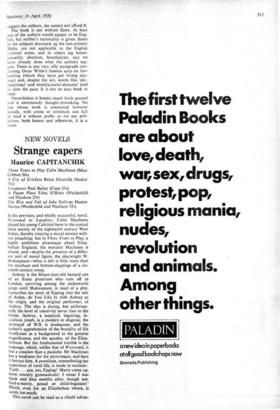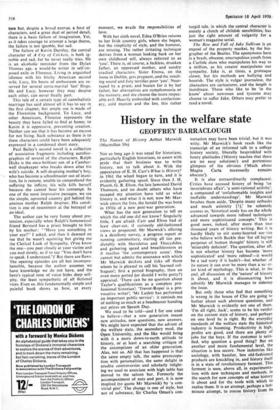NEW NOVELS
Strange capers
Maurice CAPITANCHIK
Three Years to Play Colin MacInnaa (Mac- Gibbon 30s) A Cry of Crickets Brian Glanville (Seeker 35s) Trespasses Paul Bailey (Cape 25s) A Pagan Place Edna O'Brien (Weidenfeld and Nicolson 25s) The Rise and Fall of lake Sullivan Hunter Davies (Weidenfeld and Nicolson 35s) In his previous, and wholly successful, novel, Westward to Laughter, Colin Maclnnes placed his young Calvinist hero in the cynical slave society of the eighteenth century West Indies, thereby creating a moral tension with- out preaching; but in Three Years to Play, a highly ambitious picaresque about Eliza- bethan England, the moralist MacInnes is absent, and—despite the presence of a differ- ent sort of moral figure, the playwright W. Shakespeare—what. is left is little more than the mayhaps and bottom-slappings of a six- teenth-century romp.
Aubrey is the fifteen-year-old bastard son of an Essex prostitute who runs off to London, surviving among the underworld gangs until Shakespeare, in need of a plot, transcribes his story of Epping into the tale of Arden, As You Like It, with Aubrey as the origin, and the original performer, of Audrey. The idea is daring, but unfortun- ately the level of creativity never rises to the theme. Aubrey, a sceptical, inquiring, in- cautious youth, is a modern in disguise; the portrayal of W.S. is inadequate, and the author's apprehension of the brutality of life insufficient as a background to the genuine magnificence., and the squalor, of the Eliza- bethans. But the fundamental trouble is the language, which, unlike that of Westward, is less a creation than a pastiche. Mr MacInnes has a weakness for the picturesque, and here it betrays him. A prostitute, remembering her experience of rural life, is made to exclaim: 'Faith. aye, yes, Epping! Marry come up, those country gymnasticals! I swear I was black and blue months after, though not, God-a-mercy, poxed or child-begotten!' Which, even for an Elizabethan whore, is surely too much.
This novel can be read as a ribald adven- tire but, despite a broad canvas, a host of characters, and a great deal of period detail, there is a basic failure of imagination. Yet, as it takes courage to attempt a large theme, the failure is not ignoble, but sad.
The failure of Kevin Darnley, the central character of A Cry of Crickets, is both ig- noble and sad, for he never really tries. He is an alcoholic reminder from the Dylan Thomas age, a would-be writer in self-im- posed exile in Florence. Living in anguished idleness with his bitchy American second wife, Lucy, his bouts of enthusiasm are re- served for several extra-marital 'last' flings. He and Lucy, however they may despise each other, can never finally part.
This tale of a certain type of cannibalistic marriage has said almost all it has to say in the first chapter, but ample use is made of the Florentine background. To Lucy, and other Americans, Florence represents the beauty they have failed to find at home; to Kevin it is oppressive, preventing creation. Neither can see that it has become an excuse for not living. Such substance as there is to these characters could have been adequately expressed in a condensed short story.
Paul Bailey's second novel is a collection of associative fragments including autobio- graphies of several of the characters. Ralph Hicks is the once-brilliant son of a Camber- well shopkeeper who breaks down after his wife's suicide. A self-despising mother's boy, who has become a schoolmaster out of inani- tion, he is remote, unable to comprehend the suffering he inflicts; his wife kills herself because she cannot bear his contempt. In one of the most impressive passages, we see the simple, uprooted country girl behind the anxious mother Ralph despises. His condi- tion is one of resentment at the betrayal of an ideal.
The author can be very funny about pre- tension, especially when Ralph's homosexual friend Bernard has a priest brought to him by his mother: "Have you something in your eye?" I asked, and then it dawned on me that he wasn't squinting but giving me the Clerical Look of Sympathy. (You know the one—you peer closely at your victim and you nod slowly, as if to say "You don't have to speak. I understand.")' But there are flaws. The opening episodes are all but incompre- hensible, because the author assumes we have knowledge we do not have, and the hero's typical tone of voice hides deep self- pity, the least sympathetic of all fictional vices. Even so, this fundamentally simple and painful book shows us how, at every moment, we evade the responsibilities of love.
With her sixth novel, Edna O'Brien returns to her Irish country girls, where she began, but the simplicity of style, and the humour, are missing. The rather irritating technique derives from a woman looking back on her own childhood self, always referred to as 'you'. There is, of course, a feckless, drunken father, an oppressed mother, and sundry cracked characters. Sister Emma, on the loose in Dublin, gets pregnant, and the result- ing sound and fury terrifies poor 'you'. Near- raped by a priest, and beaten for it by her father, her alternatives are nymphomania or the nunnery, and she choose the more respec- able evil. Heavily embroiled with confection- ery, cold mutton and the loo, this rather turgid tale, in which the central character is merely a clutch of childish sensibilities, has just the right amount of vulgarity for a woman's magazine serial.
The Rise and Fall of lake Sullivan is an expose of the property market, by the bio- grapher of the Beatles. The eponymous hero is a brash, obscene, unscrupulous youth from a Carlisle slum who manipulates his way to a million, as his creator manipulates our sympathy. Jake is, at times, a grotesque clown, but his methods are bullying and boorish. The style is vulgar journalese, the characters are caricatures, and the length is inordinate. Those who like to be 'in the know' about newsmen and tycoons may choose to suffer Jake. Others may prefer to read a novel.







































 Previous page
Previous page